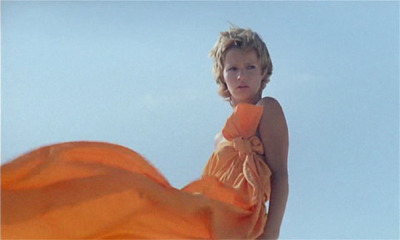Who'da thunk a boy born to a family of engineers and scientists would later become a writing and filmmaking genius. Beginning as a novel writer, and entering the film world with, somewhat of a bang, he wrote the screenplay to Last Year in Marienbad (1961, Alain Resnais). It's evident to any fan of Robbe-Grillet fan as to why he moved to directing. It's been said by Resnais himself that Robbe-Grillet "delivered a screenplay so detailed, down to indications of soundtrack and camera movement, that [he] confessed to feeling like a mere 'robot' in the first weeks of shooting." When one can make one of the most visually stimulated directors ever, feel unimportant, it's clear where he should use his skills.
A lot can be said about Alain Robbe-Grillet. He loves nudity, that's one thing. Every film has a woman showcasing her goods for our enjoyment or disgust (I don't discriminate). But it's never just to show the nudity, no, they're shown for a bigger purpose (get your head out of the gutter.) Robbe-Grillet shows nudity to show the power and freedom that women have. He is -- and I've used this word many times to describe Robbe-Grillet -- a philogynist. To see his love of women, his respect and admiration is something to be lauded.
In all of the Robbe-Grillet directed films I've had the pleasure of viewing (L'immortelle (1963), Trans-Europ-Express (1966), L'homme qui Ment (1968), L'éden et Après (1970), Glissements Progressifs du Plaisir (1974), Le jeu avec le feu (1975)) they all share a certain entrapment quality. The women, be it by men, government or their mind, are trapped and watching their reactions to their situation is where Alain Robbe-Grillet comes in. His style isn't clear cut and in your face, it's subtle and nuanced; his work can be described as a cubist painting in motion. Upon viewing one of his films, you never grasp what you're viewing until the end. And even at the end, you're not fully aware of what you just watched. The many different layers seem awkward at first glance, but in later retrospect, come to form a product so magnificent, it's hard to wonder why you didn't love it at first.
My first experience with Robbe-Grillet is L'éden et Après. I had no idea what I was getting myself into, and I came out a little confused. I essentially slept on, and it's then that I came to my Aha! moment. Similar to one of my most favoritest films of all time, Mulholland Drive (2001, David Lynch), this film shows the inner workings of a woman anxious to escape her reality. Her reality is the monotonous college life, with the same friends, and the same café, the same old life. Until suddenly, and without warning, her life, and the life of her colleagues, becomes a lot more adventurous, when a mysterious man comes to the café. To say more is to deprive you of your possible enjoyment of the film, so here is where I cease to divulge into the story. However, this film shows the beauty of the world. From the set design, to the costumes, to, of course, the cast, everything is beautiful. It's a world that Robbe-Grillet pictures, and it's a magnificent world.
There is an air of pretense to any Robbe-Grillet film. Like any Avant-Garde artist, you will never fully understand everything, the pleasure lies in your interpretation. And it's clearly evident, the man is well educated in mythology, religion, and sadomasochism (don't ask). He is a filmmaker who expanded and bettered the art, though unbeknown to many filmmakers. His narrative form is one to be envied and editing style is fast, fluid, though not overbearing and childish in it's delivery. It's a shame that his prowess isn't well known and loved, and it's my attempt to expand his base, and increase awareness to Robbe-Grillet's genius.


No comments:
Post a Comment